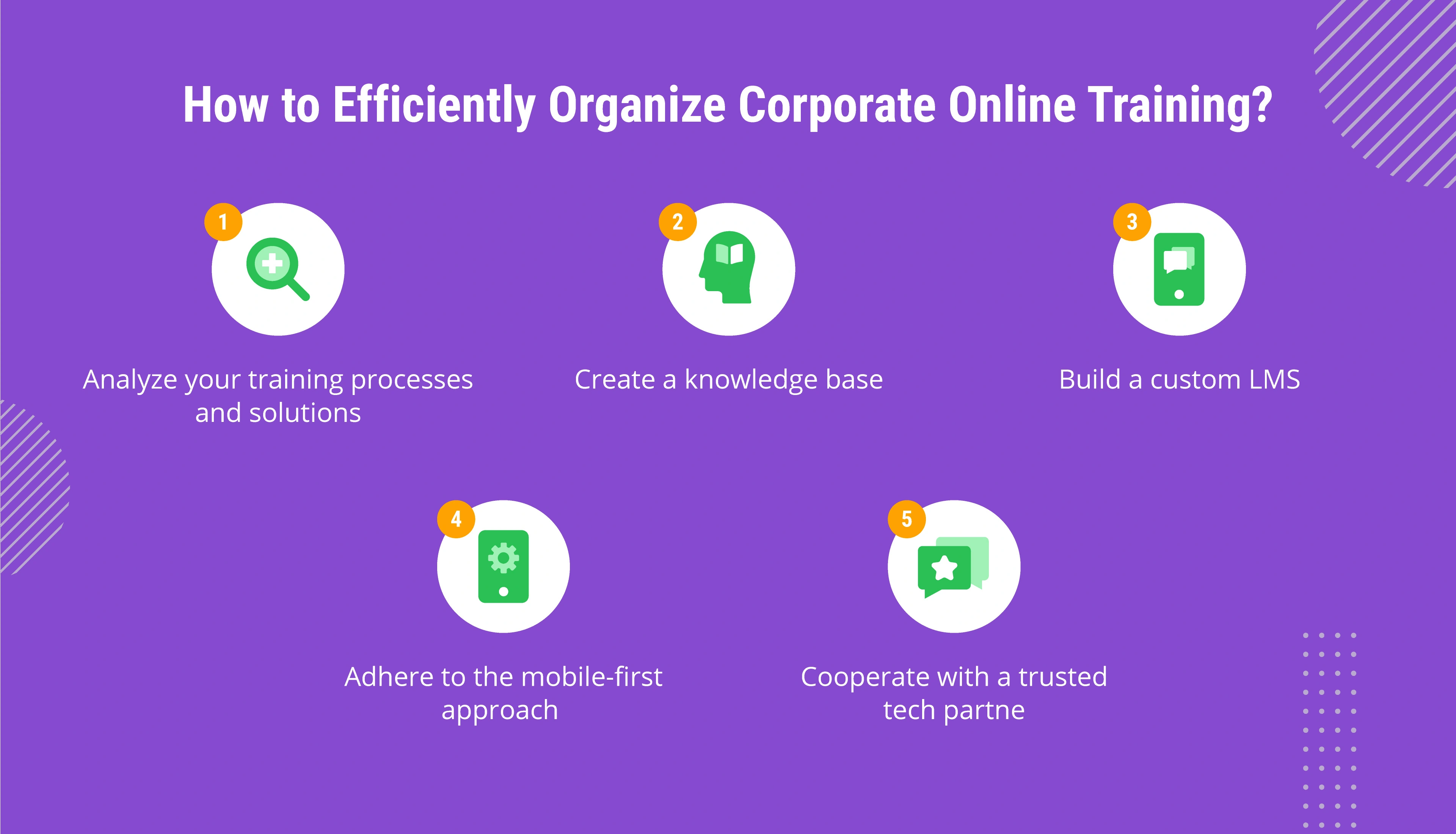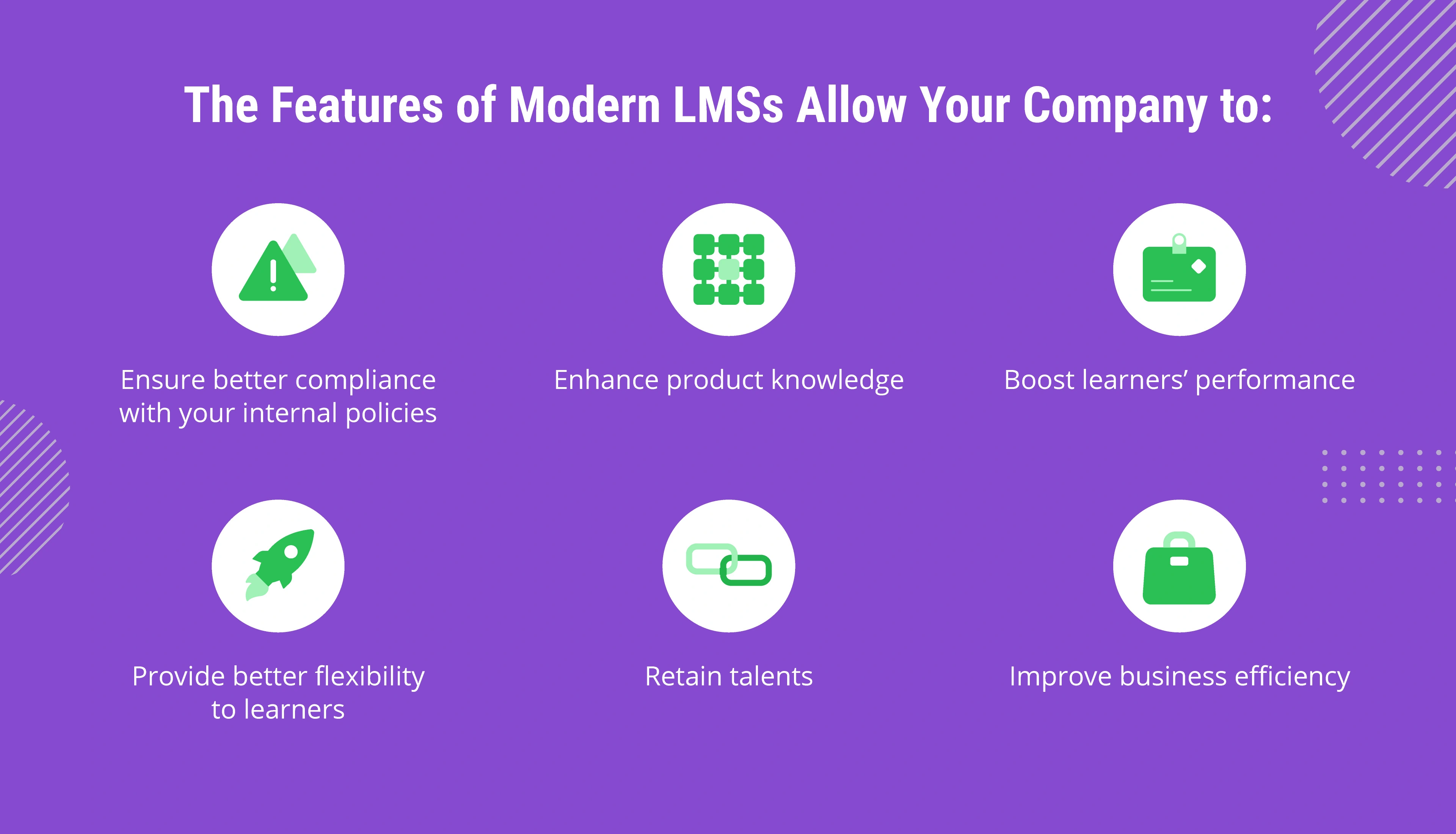5 Key Steps to Create an Online Training System in Your Organization
Table of contents
In a time when trends change at a rapid pace, new technologies appear every day, and week-old information can already be outdated, the importance of corporate online training is undeniable. This is the main reason for companies to turn to LMSs and continue to invest significant resources in corporate training development and creating own training courses.
What are the main advantages of online learning? What steps should you follow to build an efficient online learning model? Who can help you with this? Our experts know the answers to these questions and are ready to share valuable information with you.
Why Is Employee Training Crucial?
A company that pays great attention to the process of training its employees and improving their skills immediately increases productivity, retention, and engagement.
Online platforms for corporate training educate employees on how to effectively use technology, reduce technical mishaps, promote safety and health among employees, as well as decline supervision since trained employees do not require frequent supervision or tight control. They are often well aware of their duties and responsibilities.
Moreover, according to Forbes, a whopping 93% of employees would stay at a company longer if it invested in their careers. The development of corporate training and the introduction of all the necessary tools for this signals that the organizations value their people and are strongly interested in their success — not just on the job but over the long haul.
How to Organize Corporate Online Training?

Today, the market of online training platforms offers a large number of solutions, many of which are well known and have long been widely used in various companies. For example, Zoom for online lessons, various online tools for employee assessment, cloud solutions for storing important data for staff onboarding, etc. However, given the variety of training solutions and tools, how can you understand which one is best suited and can bring the most benefits to your business? Let's try to figure it out.
1. Analyze Training Solutions You Already Use
Do you send PowerPoint presentations or articles from educational journals to your employees when you want them to obtain particular information? Do you want to track a formal training process in place and have a system that can easily generate training reports? Is your industry governed by strict regulations that you need to comply with? Do you want to train a remote and mobile workforce or just want to create an online course?
If you answered yes at least once, you should think about a corporate knowledge base. A single knowledge base will also be an excellent solution for those companies that use several tools to train their employees but want to systematize information and have the necessary material and tools in one place.
2. Create a Knowledge Base
The next important step is to create a knowledge base. With a single knowledge base, you will only need to provide your employees access to the materials they need to obtain. It is also worth noting that the information in the knowledge base should be secured and protected from cyber-attacks and constantly updated in order to achieve greater training performance.
A single knowledge base provides development opportunities for all employees. Information that is readily available helps teams make more informed decisions: customer support can resolve problems faster, marketing can produce more useful content, sales can close deals faster, and insights teams can distribute their research more effectively.
Of course, online learning projects do not directly affect sales. But it is important to mention that thanks to the knowledge base, the onboarding process is much faster and better, and after a short time, employees are fully engaged and begin to share corporate values. All these results in increased employee retention. Furthermore, it is easier to scale a business that has built an effective corporate learning model.
Once organizations understand the necessity for a knowledge base, they need to realize that ready-made solutions can’t address all the challenges of an organization that scales.
3. Develop a Custom LMS
The market is full of reliable products, and new ones join the club every year. But the thing is that out-of-the-box LMSs are designed to be “one-size-fits-all” 一 that’s why they can hardly meet all your business's unique needs. Moreover, many systems are designed for small businesses and can’t handle a heavy workload which is typical for a company that grows.
Building an LMS from scratch has a number of important advantages. A custom LMS can be easily integrated with other software your company uses, which helps automate processes and save a lot of time. You have total control over upgrades and updates; from the architecture and feature set to the colors of the buttons, you decide how the system is built. Finally, in the case of larger companies, LMSs are cheaper in the long run because you don’t have to regularly purchase licenses and subscriptions.
4. Adhere to Mobile-First Approach
Modern learners prefer learning on the go through mobile gadgets, so it’s essential that your LMS is mobile-friendly.
User-friendly interface that is a joy to see, gamification elements, which allow earning points and completing courses with other players for rankings 一 these are just a few of features that contribute to better employee engagement and involvement in the learning process.
Mobile LMSs are advantageous not only for employees but also for a company.

5. Cooperate With a Technology Partner
No matter its industry or size, a company can only be as successful as its employees are. That’s why meeting their needs and creating a positive learning experience should always be a priority for employers. Most non-technology companies don’t have enough expertise to develop a software solution to meet these needs, so you’d better outsource this process to a reliable technology partner.
At Emerline, we have extensive expertise in the e-learning industry and mobile technologies to develop an LMS app to satisfy your needs and requirements and offer full-cycle services that cover each stage of product development. Feel free to contact our experts in case of any questions.
Published on Apr 11, 2023





